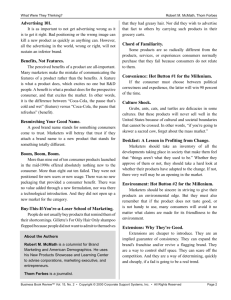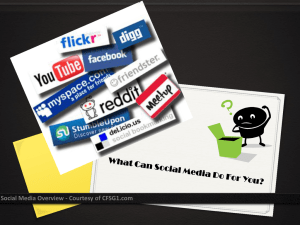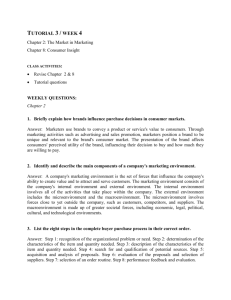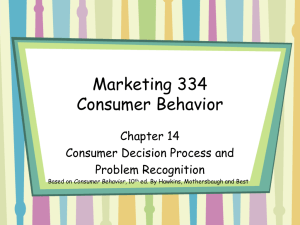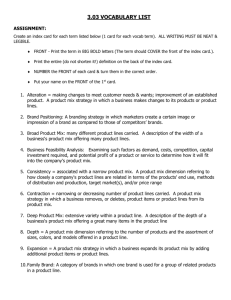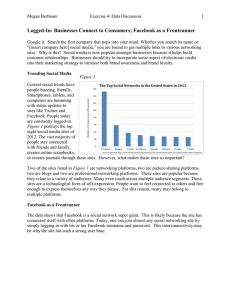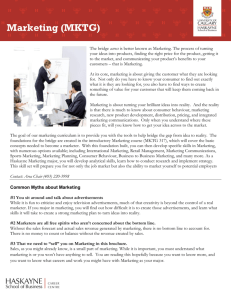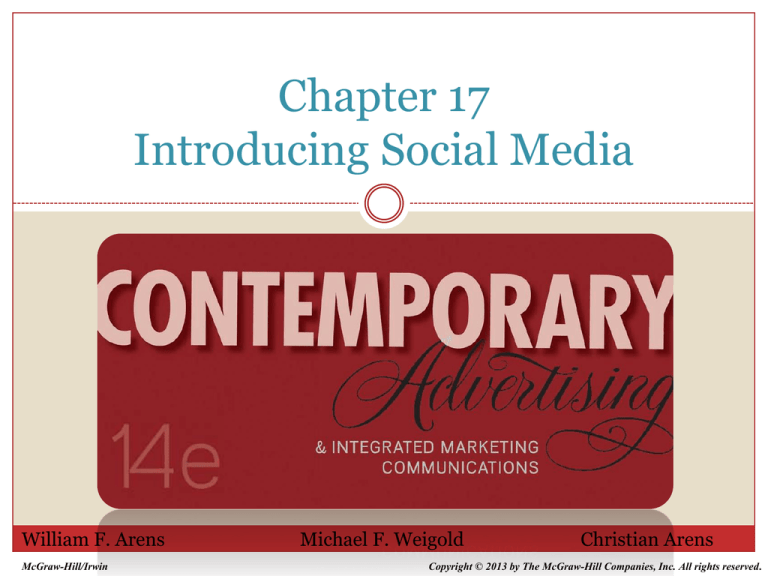
Chapter 17
Introducing Social Media
William F. Arens
McGraw-Hill/Irwin
Michael F. Weigold
Christian Arens
Copyright © 2013 by The McGraw-Hill Companies, Inc. All rights reserved.
Chapter Overview
Explore how social media are changing
the way advertisers think about
engaging with their audience
17-2
Chapter Objectives
Discuss how social media
differs from traditional
media
Explain the various ways
social media can be used
Discuss how social media
have changed consumer’s
behavior
Explain how to manage
social media on behalf of a
brand
Define the different
applications of social media
17-3
Introducing Social Media
Facebook
Twitter
Blogs
YouTube
17-4
Social Media Personas
17-5
Advertising $$ Spent on Online Media
17-6
Adoption of Social Media
Advertisers are
cautious; need to
interact carefully
with social media
Complaints
can go viral
Likes can
go viral
17-7
Social Media’s Penetration by Age Group
Over 80% of the global Internet
uses social networking
17-8
Top Ten Social Websites and Forums
17-9
Social Trends
Social media have become technological
interpretation of our own natural behavior
Limited ability to imitate complex human behavior
Trending—what people are talking about on social
media
Social mediums can “trade” information based on
permissions granted by the user
17-10
Who Uses Social Media?
17-11
Types of Social Media
Forums
Blogs
Data explosion
Social
networking
Microblogs
Social
bookmarking
Wikis
RSS
17-12
Effects of Data Explosion
Data collection gives marketers a greater
understanding of how their audience interacts,
shares, likes, dislikes, and feels about their brand
Software as a service (SaaS) can help marketers
harness this information
Tweetdeck allows users to
follow multiple topics at
once and for marketers to
follow the conversations
17-13
Managing Social Media
•80%
planning
Traditional
•20% execution
Media
Social
Media
•20% planning
•80% execution
17-14
Managing Social Media
Web site—an
owned property
Companies post on
social media for
free
Companies employ
or outsource social
media page
maintenance
17-15
Managing Social Media
Danger of boring
or overwhelming
the audience or
over tweeting
Software can
help control a
company’s social
presence
Listening tools
help manage
fragmentation
17-16
Building Social Authority
Transparency and authenticity
Value beyond pricing
Connect brand to customer’s heart,
an emotional response
Pepsi remains
authentic by
using social
media for good
causes
17-17
Building Social Authority
Two way brand communication
Instantaneous feedback mechanism
Amplifies word of mouth (WOM) and makes it measurable
Factors
influencing
consumers to
try local
business
17-18
Customer Service in Social Media
Immediate customer response
Customers help each other in
product forums
• Helps company’s customer service
department
17-19
Social Media by the Numbers
Amount
Activity
210 billion
Emails sent daily
3 million
Images uploaded to Flickr daily
$145 million
Daily mobile services revenue
700,000
New Facebook members daily
45 million
Facebook status updates daily
5 million
Tweets posted daily
900,000
Daily blog postings
17-20
How Social Media Transforms Business
Dollars transferred from traditional media to social
media
Ad agencies increase ad placement on social media
Employees staff social media sites
Social media influences purchases
Increases customers, increases revenue
Social media users
Follow brands
Search for jobs
Companies use social media as a marketing channel
17-21
Common Uses of Social Media
Blogs
Brand
monitoring,
social listening
Remarketing
and MROCs
Customer
Service
Social ads
Crowd
sourcing
Entertainment
Games and
gamification
Reviews and
opinions
17-22

